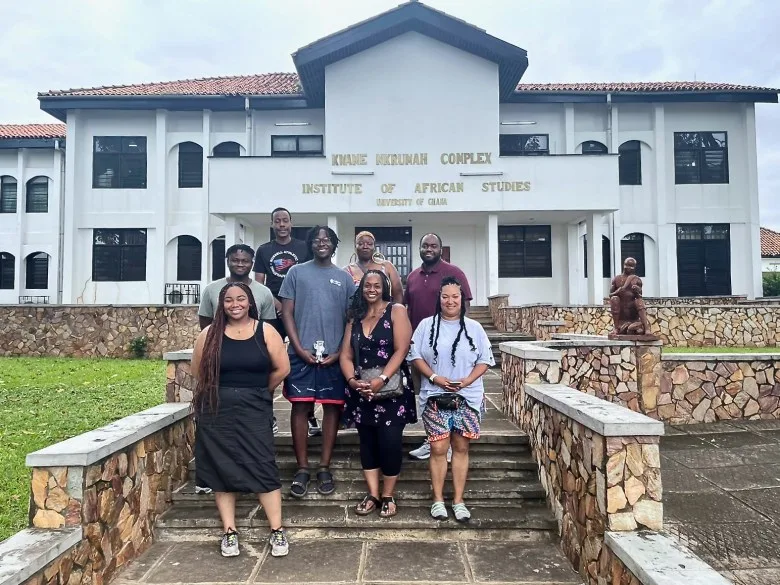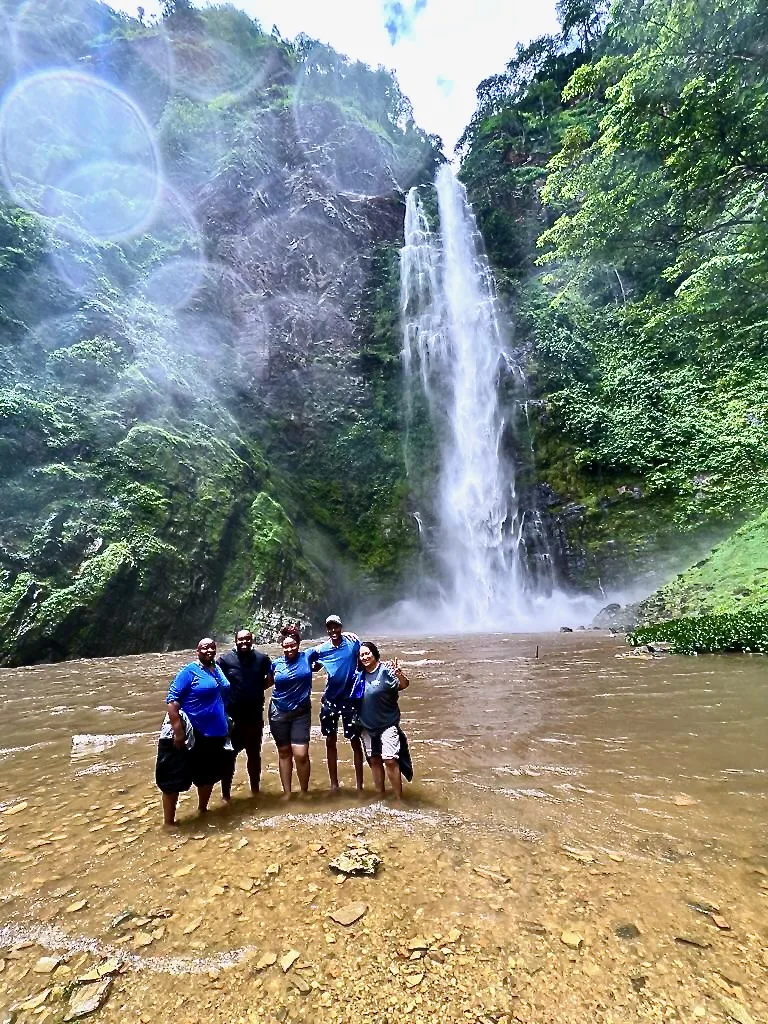This summer, Trinton Jones stepped into his ancestral past.
Jones, an Evanston resident, was one of four Oakton College students who traveled to study in the Republic of Ghana, connecting with their African heritage as well as broadening their horizons.
The students immersed themselves in the culture of the country and took courses in Ghanaian history and literature at the University of Ghana in Accra.
Jones and his fellow study-abroad participants spent most of June in the West African nation, attending classes and navigating the joys and challenges of everyday life there.

“I feel it’s extremely important that African American students, and non-students for that matter, should take an opportunity to go to Africa, explore the countries there, experience the culture and experience your roots. That’s pretty much where you’re from,” Jones said in an interview with the RoundTable.
Traveling halfway around the world allowed Jones to trace his ancestral past. “Learning I was part Ghanaian before I even left [the U.S.] – that heightened my experience in going there,” he said.
A small percentage
Jones and his group were among the small percentage of African American students who study abroad in an African nation. Joining him were Oakton students Jernone Smith, Tyson Dean and Gerri Smith. Jernone Smith also is an Evanston resident. Oakton faculty member Lara Roemer and Chicago State University student Kori Riley were also part of the group, with additional participants from Malcolm X College in Chicago.
Together they flew overnight from Chicago to Accra, Ghana’s capital city. During their weeks there, they explored metropolitan Accra as well as the Ghanaian countryside.
The country’s history up to and beyond the end of colonial rule came alive during walking tours. Visiting Accra’s Independence Square, also known as Black Star Square, illuminated Ghana’s journey to become the first colonized African country to gain independence, on March 6, 1957.
‘Nothing could really prepare you’
After a three-hour drive from Accra, the students walked in the footsteps of enslaved African people who suffered at Cape Coast Castle. As many as 1,000 people at any given time were held for months in the castle’s dungeons and tortured, before exiting through the “Door of No Return” and loaded onto ships. Those who survived the Middle Passage were sold into slavery in the Americas.
He had seen video tours of the castle dungeons, “but nothing could really prepare you for actually being in there, walking through them,” Jones said.
“In a few, you can even still smell all of what happened in that specific dungeon – the blood. It’s a little overpowering. The tour guides didn’t leave out the details, which I do feel is important… They tell you what was done to the men, women and children,” said Jones. He added that it is hard to put into words how it felt to be in the castle-dungeons, where enslaved people were viewed not as human beings, but as property.

The students visited Jamestown, one of the oldest and most historic districts in Accra, and also went to Ho in the Volta Region, “which is more rural and mountainous,” Jones said.
“A lot of people live in the mountains, which were really beautiful… Children there walked as far as two miles to get to school. Education is really important to them,” he said.
Interacting with the people in Ghana, Jones said, he learned that Ghanaian women hold significant leadership roles within their communities, merging contemporary life with tradition. They “are strong, hard-working and active in politics. They have what they call ‘queen mothers’ who are leaders in local governance. I did not expect them to be so progressive in fighting for women’s rights and equal pay for everyone – the wages there are extremely low.”
Jones said he went into the program “kind of getting out of my American mindset, trying to dive into [Ghanaian] culture fully.”
Still, some things took getting used to. He arrived in Accra knowing “it was going to be a lot of people,” Jones said, but “the sheer mass of people in one city… The biggest culture shock was the traffic… It was Chicago traffic times ten.”
Cars, buses, and motorbikes jostled for space on the roads, Jones said. Adding to the traffic in Accra were “people walking in the road, selling things. You might see a goat alongside the road, or sheep. You never know what you will see.”
Jones was surprised to find that there was no lull in the level of activity. “It seemed that the people don’t sleep there at all. They have night markets that run all night. You still had vendors in the street or alongside the road selling things,” he said.
The learning opportunity in Ghana was facilitated by Oakton College in partnership with EDU Africa, which coordinates learning programs in sub-Saharan Africa. Oakton faculty members laid the groundwork in 2022 – traveling to Ghana through a U.S. Department of Education Fulbright-Hays grant for curriculum development. While there, Katherine Schuster, Oakton professor of education and global studies, planned the study-abroad program. A year later, on June 4, Oakton students embarked on their transformative journey.
Schuster said the program sparked excitement that spread far beyond the Oakton College campus, making it possible to fully cover the cost for this year’s student participants. “It was quite extraordinary, in my experience – the funding that the community was able to gather for these students [to study in Ghana] this summer.
‘Energy and interest’
“It really goes to show what happens when we expand opportunities for study abroad… out of Europe and into the rest of the world. When we do that, there is this energy and interest from places within the community that may not have been engaged with some of the more traditional study-abroad destinations,” Schuster told the RoundTable.
The National Survey of Student Engagement (NSSE) for Effective Educational Practice designates study abroad as a High Impact Practice – an educational experience that makes a significant difference to student persistence, learning outcomes and student success. Yet underrepresented minority and first-generation college students are less likely to get this opportunity, according to reports released by NAFSA: Association of International Educators. NAFSA advocates for policies such as the Senator Paul Simon Study Abroad Program Act to expand the total number of U.S. students studying abroad, increase the diversity of study-abroad students to more closely match the undergraduate population, and encourage study in nontraditional locations.
Students who identify as African American or Black are particularly underrepresented in U.S. study-abroad programs, based on data from the Institute of International Education’s “Open Doors” report and the U.S. Department of Education’s National Center for Education Statistics.
In 2018-2019, Black students studied abroad at their highest rate to date at 6.4%. The rate dipped significantly during the COVID-19 pandemic, due to its disparate impact on the African American community. In 2020-2021, only 4.1% of U.S. students abroad were Black, even though they comprised 13.1% of U.S. postsecondary enrollment. In the same year, 68.3% of students who studied abroad were white, or Caucasian, which exceeds their postsecondary enrollment rate of 54%.
Not only is there a disproportionately low number of Black study-abroad participants, but the total number of U.S. students who travel to the African continent is also low. Africa was the host region for fewer than 3% of American students in 2020-2021, while Europe hosted 66.3% of American students in the same academic year, according to Open Doors data.
‘The presence of so many people of color was calming’
Jones said he felt a shared sense of community with the Ghanaian people, even though it was obvious to them that he was American. He was not one of a few Black people in the spaces he occupied there, as he often is in the U.S., where Black Americans represent only about 13% of the population. “The presence of so many people of color was calming,” he said, even amid the hustle and bustle of Accra.
He gave a special shout out to his fellow student travelers. “Building those connections made my experience even better.” He offered this advice to prospective study-abroad participants: “If you are doing one of these programs, befriend the people you travel with, because you are with them a lot.”
Support for the program came from many parts of the community, starting with donors to the Oakton College Educational Foundation’s Study Abroad Fund. Additional support came from the Oakton College Student Government Association, Evanston Cradle to Career, Evanston North Shore Branch NAACP, and L&J’s YoFresh Foundation.
Three of the Oakton students who travelled to Ghana are enrolled at the college through the Emory Williams Academy for Black Men, a program designed for historically underserved and underrepresented students, emphasizing focused support for Black male-identifying students.
Dr. Larry Murphy and his wife, Dr. Jean Murphy, formed L&J’s YoFresh Foundation to award grants to help African American high school juniors and seniors cover the cost of international travel experiences. “The genesis of the initiative was our own travels in European, African and other countries… It was our realization of the benefits of international travel, and the realization that it was not happening for African American youth the way it does for youth of other identities,” Dr. Larry Murphy told the RoundTable.
Although it was the college’s first study-abroad opportunity in Africa, Oakton students have studied in other regions of the world, including India, Ireland and Poland. The college partners with the Illinois Consortium for International Studies and Programs (ICISP) to increase study-abroad locations, Schuster told the RoundTable.
Schuster said Oakton College hopes to make the study-abroad program in Ghana an annual experience. “Experiential learning opportunities like study abroad play a key role in preparing students to develop skills needed to reach their academic and personal goals and help Oakton realize our vision of creating just and thriving communities,” she said.
Jones hopes the Ghana program continues. “I believe it will and should continue in the future. Hopefully, it will continue to grow, and more students will sign on board.”
For himself, Jones brought back a takeaway: “I definitely want to be even more connected to my family than I am now. The sense of family and community [in Ghanian culture] is something I brought back with me.”
RoundTable intern Sophia Sherman was a contributor to this story.
Support the RoundTable!
As a member of the RoundTable, your support throughout the year supports our work covering all the vital news that matters in Evanston! Please consider making an additional gift!
Become a member of the RoundTable!
Did you know that the Evanston RoundTable is a nonprofit newsroom? Become a member today to support community journalism!





